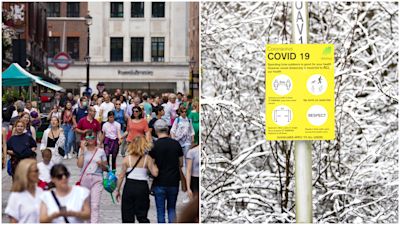Insight
Covid: Scientists warn of mass return to normality amid fears of a winter spike

There is a sense among many that the Covid pandemic is virtually over.
It's noticeable as you walk around the streets, or into shops, where there are fewer masks; you can see it in the people gathering together inside pubs, hugging as they meet; or those crowding together on busier trains. But among the scientists working in this field, including dozens advising ministers, the mood is totally different - not relaxed, but anxious, even scared.
The key worry among several scientists I've spoken to is simple: it is the rate of Covid.
With nearly 40,000 new infections a day across the UK, and hospitalisations up too, there is worry that pressure on the NHS will become a major concern. Last summer, those figures had been pushed right down before schools returned, with the risk of massively increased mixing.
But in 2021, the situation was already bad as millions of children headed back in England, Wales and Northern Ireland.
And in Scotland - where pupils began earlier - the infection rate is the highest recorded in the entire pandemic.
While it is true that the vaccines have been remarkably effective, especially with deaths - they are not perfect, and with such high rates it is inevitable that more will fall seriously ill as a result of this disease. Scientists are looking at those statistics and worrying about what is to come during the winter.
Moreover, there had been some relief that people's cautious behaviour continued for some weeks after the rules were relaxed, but the signs suggest that is changing now. Professor Danny Altmann of Imperial College, who is on the SAGE immunology taskforce, said that after many phases of Covid, that began in the early days with us "being unified in our growing terror", we are now entering a confused phase in which there is an "unwillingness to engage with the devil in the detail".
"At a time when we seem to be encouraged to get over it, get back into offices, schools, universities, restaurants - learn to ‘live with the virus’ I know few scientists or doctors who don’t find this terrifying and incomprehensible," he told ITV News.
"We look at Covid-19 data massively worse than this time last year, and, barely into the Autumn, hospitals are already at breaking point," he added, describing Delta as "a very unforgiving foe". Others tell me of similar fears - warning that schools and universities reopening while prevalence is so high could lead to the numbers pushing up far higher. So are those who advise ministers pushing for a circuit breaker lockdown over half-term, as rumours suggested last week?
Not as far as I can tell (although perhaps in part because they know how politically unpalatable a lockdown would be).
But they are wondering if some new measures will be required on top of the plans already being made. One question I've heard raised is whether it was too soon to relax isolation rules in August, with people now free to simply carry on almost as normal if they've been in contact with someone positive with Covid. Another is why there have been delays in vaccinating teenagers.
For some, the Joint Committee on Vaccination and Immunisation's failure to advise vaccines for children is frustrating because they believe a summer programme was what was needed.
And there is also concern around any mass shift in working patterns that could suddenly drive more people back to the office. Meanwhile, there is clamour for boosters to be rolled out - especially for those whose second jabs were back in January. All in all, the situation is adding up to a period in which many of us are trying hard to relax about Covid, but the scientists are simply unable to.
Coronavirus: What you need to know
"We need to keep readjusting our thinking," added Altmann who described it as puzzling that scientists' worries about the data had been lined up against the sense among others that "hooray, the pandemic is over".
"That includes the need for extreme caution in the dangerous experiment letting Delta rip through our schools. I’ve no idea how we bring politicians and the public back on board to consider some of those concerns."